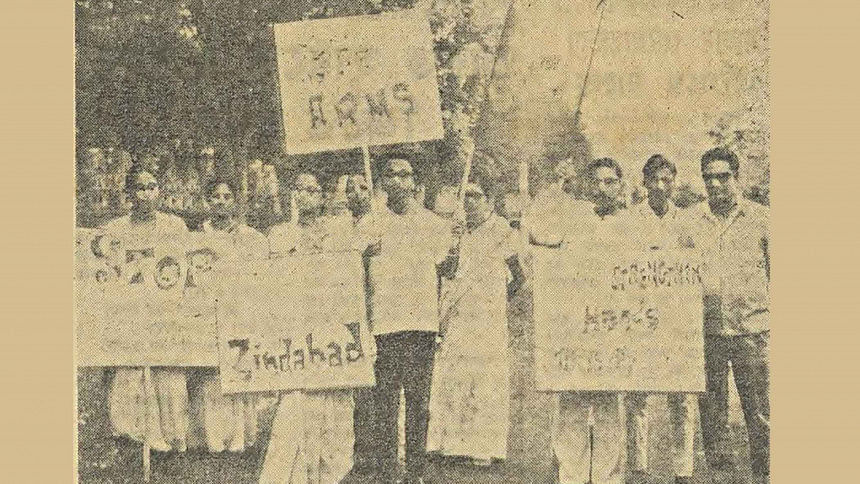11 nations decline aid to Pakistan

June 25, 1971
AID POSTPONED
The major aid-giving nations, led by the World Bank, quietly agreed to postpone indefinitely any new economic assistance for Pakistan.
The 11 donors reached a consensus at a meeting on June 21, 1971 in Paris, it was learned today. The informal decision was taken after a mission from the World Bank and International Monetary Fund reported after a visit that Pakistan was in administrative and economic shambles.
The agreement would not affect the humanitarian assistance that nations intend to give Pakistan or its refugees in India. It does, however, hold up several hundred million dollars in development funds on which Pakistan President Yahya Khan's regime had been counting.
In the previous year in which normal aid flowed -- the budget year ending June 30, 1970 -- Pakistan received $316 million from the donors.
In addition, it was learned, the IMF decided for now against giving the central government a $250 million package of foreign exchange that the Fund had been considering.
The Paris consensus was reached with the assent of the United States, despite strong urgings to the contrary from some US quarters. Washington's ambassador to Pakistan, Joseph S Farland, was known to believe the donor nations should meet soon to pledge assistance to greater influence the central government and lessen its dependence on China.
But the Paris meeting concluded that no early gathering of the aid consortium should be held because it would openly confirm the widespread opposition to assistance now.
According to reliable sources, Belgium, Canada and Britain argued strongly in Paris that public opinion in their countries deeply opposed aid to Pakistan and that none should be forthcoming until Yahya's regime reestablished civilian rule in East Pakistan.
CHOLERA CASES AND DEATHS DOUBLED
The World Health Organization said today that there had been 64,924 cholera cases and 10,595 deaths from cholera, throughout the world so far, more than double the figures for the same period in 1970.
The most serious outbreak of the disease is in West Bengal where 24,394 cases and 3,588 deaths were recorded up to June 20 among Bangladeshi refugees.
PROTEST RALLY BEFORE US EMBASSY
A protest rally of Bangladeshis, led by KM Shehabuddin, representative of the Bangladesh government and former second secretary to the Pakistan High Commission in India, was held in front of the US embassy in New Delhi. The demonstrators handed a memorandum to the US embassy officials. The memorandum urged the US government "to stop ships from proceeding to Pakistani ports and to take back the weapons. We can assure you that by such an act, the great American people will earn the lasting gratitude of our emerging nation at the critical juncture for helping it to protect democracy and the most basic human freedom and the lives of millions".
TAMABIL AND JAFLON FREED
Two companies of EPR under the command of Subedar Major BR Chowdhury attacked Pakistan army locations at Tamabil and Jaflong. After a fierce fight, the Bangladeshi forces succeeded to free the two important areas. Two freedom fighters embraced martyrdom in the operation.
Shamsuddoza Sajen is a journalist and researcher. He can be contacted at [email protected]

 For all latest news, follow The Daily Star's Google News channel.
For all latest news, follow The Daily Star's Google News channel. 



Comments